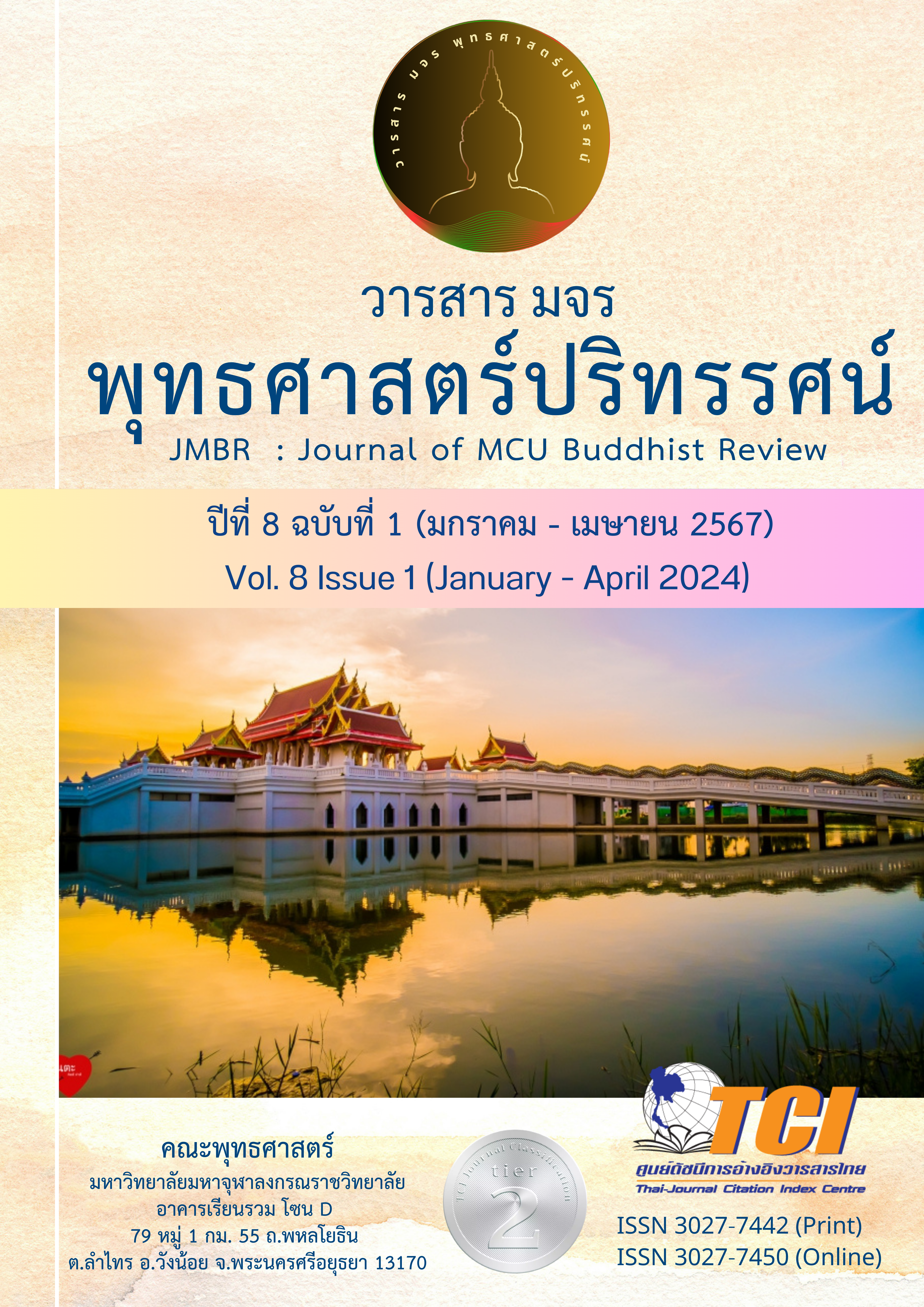การพัฒนาผลสัมฤทธิ์ทางการเรียน เรื่องวัฒนธรรมไทยสำหรับนักเรียน ชั้นมัธยมศึกษาปีที่ 3 โรงเรียนเทพศิรินทร์พุแค สระบุรีโดยใช้บอร์ดเกม
Main Article Content
บทคัดย่อ
บทความวิจัยนี้มีวัตถุประสงค์เพื่อ 1) พัฒนาบอร์ดเกม เรื่อง วัฒนธรรมไทย สำหรับนักเรียนชั้นมัธยมศึกษาปีที่ 3 2) เปรียบเทียบผลสัมฤทธิ์ทางการเรียนหลังจากใช้บอร์ดเกม เรื่อง วัฒนธรรมไทย และ 3) ศึกษาความพึงพอใจของนักเรียนหลังการใช้บอร์ดเกม เรื่อง วัฒนธรรมไทย เป็นงานวิจัยกึ่งทดลอง กลุ่มตัวอย่างที่ใช้ในการวิจัย ได้แก่ นักเรียนชั้นมัธยมศึกษาปีที่ 3/7 โรงเรียนเทพศิรินทร์พุแค สระบุรี ภาคเรียนที่ 1/2566 จำนวน 40 คน ได้มาโดยการสุ่มแบบกลุ่ม เครื่องมือที่ใช้ในการเก็บข้อมูล ได้แก่ บอร์ดเกม 13 เกม แผนการจัดการเรียนรู้ 13 แผน แบบทดสอบวัดผลสัมฤทธิ์ทางการเรียนแบบปรนัยจำนวน 30 ข้อ และแบบสอบถามความพึงพอใจ จำนวน 20 ข้อ สถิติที่ใช้ในการวิจัยได้แก่ ค่าเฉลี่ย ส่วนเบี่ยงเบนมาตรฐาน และการทดสอบค่า T-test แบบ Dependent ผลการวิจัยพบว่า 1) ผลการพัฒนาบอร์ดเกมได้บอร์ดเกม จำนวน 13 เกม และได้แผนการจัด การเรียนรู้ จำนวน 13 แผน 2) ผลการเปรียบเทียบผลสัมฤทธิ์ทางการเรียน พบว่า ผลสัมฤทธิ์ทางการเรียน หลังเรียน ( = 21.75, S.D. = 2.50) สูงกว่า ก่อนเรียน ( = 14.50, S.D. = 1.44) อย่างมีนัยสำคัญทางสถิติที่ระดับ .05 และ 3) ผลการศึกษาความพึงพอใจของนักเรียนหลังการใช้บอร์ดเกม พบว่า นักเรียนมีความพึงพอใจ ในระดับมากที่สุด ( = 4.52, S.D. = 1.52) จากผลการวิจัยแสดงให้เห็นว่าบอร์ดเกมที่พัฒนาขึ้นส่งเสริมให้นักเรียนเกิดทักษะการคิดวิเคราะห์ การคิดอย่างมีวิจารณญาณและสามารถนำไปปรับประยุกต์ใช้ในการแก้ไขปัญหาได้ ฉะนั้นในขั้นตอนการออกแบบบอร์ดเกมผู้สอนต้องศึกษาวิธีการสร้างและการเลือกเนื้อหาที่ใช้ให้สอดคล้องกันอันจะส่งผลให้บอร์ดเกมที่พัฒนาขึ้นสามารถใช้พัฒนาผลสัมฤทธิ์ทางการเรียนของนักเรียนได้
Article Details

อนุญาตภายใต้เงื่อนไข Creative Commons Attribution-NonCommercial-NoDerivatives 4.0 International License.
- บทความที่ได้รับการตีพิมพ์เป็นลิขสิทธิ์ของวารสาร มจร พุทธศาสตร์ปริทรรศน์
- ข้อความใดๆ ที่ปรากฎในบทความที่ได้รับการตีพิมพ์ในวารสาร ถือเป็นความรับผิดชอบของผู้เขียนบทความ และข้อคิดเห็นนั้นไม่ถือว่าเป็นทัศนะและความรับผิดชอบของกองบรรณาธิการวารสาร มจร พุทธศาสตร์ปริทรรศน์
เอกสารอ้างอิง
กองทุนเพื่อความเสมอภาคทางการศึกษา. (2566). หยั่งราก Active Learning สู่ห้องเรียนต้นแบบ: “เพราะไม่มีห้องเรียนที่ดีที่สุด แต่เราพัฒนาทุกห้องเรียนให้ดีขึ้นเรื่อย ๆ ได้ในทุกวัน”. สืบค้น 23 พฤศจิกายน 2566 จาก https://www.eef.or.th/article-151123/.
ชนิดา นาชัย และพรสวรรค์ วงค์ตาธรรม. (2564). การออกแบบและพัฒนาเกมกระดาน Jump for Baby Frog ที่ส่งเสริมการคิดแก้ปัญหา เรื่อง การแก้ปัญหาอย่างเป็นขั้นตอน สำหรับนักเรียนชั้นประถมศึกษาตอนปลาย. วารสารศึกษาศาสตร์ มหาวิทยาลัยขอนแก่น. 44(3), 1-19.
ทิพรัตน์ สิทธิวงศ์. (2564). การศึกษาผลของการใช้บอร์ดเกมเพื่อส่งเสริมการเรียนรู้ สำหรับนิสิตระดับปริญญาตรี คณะศึกษาศาสตร์ มหาวิทยาลัยนเรศวร. วารสารศึกษาศาสตร์มหาวิทยาลัยนเรศวร. 23(4), 187-200.
ธนวุฒิ ปัญญาพูนผล, เกศินี ครุณาสวัสดิ์ และกิตติศักดิ์ ลักษณา. (2565). การพัฒนาการจัดการเรียนรู้สังคมศึกษาโดยใช้บอร์ดเกม SOC Civilization เพื่อเสริมสร้างความเป็นพลเมืองและความสามารถในการทำงานเป็นทีมของนักเรียนชั้นประถมศึกษาปีที่ 5. วารสารวิชาการศึกษาศาสตร์ ศรีนครินทรวิโรฒ. 24(2), 123-136.
ปนัดดา พาณิชยพันธุ์ และวีรวิชญ์ บุญส่ง. (2566). ผลของบอร์ดเกม SIM Geography ร่วมกับการจัดการเรียนรู้โดยใช้เกมเป็นฐานที่มีต่อพัฒนาการคิดแบบองค์รวมทางภูมิศาสตร์ในรายวิชา สศ 2203101 ภูมิศาสตร์กายภาพ สำหรับนักศึกษาชั้นปีที่ 1 สาขาวิชาสังคมศึกษา. วารสารศึกษาศาสตร์ปริทัศน์. 38(1), 150-165.
มนัสนันท์ หัตถศักดิ์ และรัชกร เวชวรนันท์. การพัฒนาบอร์ดเกมเพื่อส่งเสริมการเรียนรู้การจัดการชั้นเรียนของนิสิตคณะศึกษาศาสตร์ มหาวิทยาลัยเกษตรศาสตร์. วารสารมนุษยศาสตร์วิชาการ. 29(2), 106-126.
มงคล ศุภอำพันวงษ์. (2562). การออกแบบบอร์ดเกมส่งเสริมปลูกฝังการอนุรักษ์สัตว์ป่าสงวน. จุลนิพนธ์ตามหลักสูตรปริญญาวิทยาศาสตร์บัณฑิต บัณฑิตวิทยาลัย: มหาวิทยาลัยสยาม.
รักชน พุทธรังษี. (2560). การประยุกต์ใช้บอร์ดเกมเพื่อพัฒนาทักษะสื่อการแสดง. วิทยานิพนธ์ปริญญานิเทศศาสตร์มหาบัณฑิต บัณฑิตวิทยาลัย: จุฬาลงกรณ์มหาวิทยาลัย.
รัชกร เวชวรนันท์. (2563). กระดุม 5 เม็ดของการออกแบบบอร์ดเกมการเรียนรู้. สืบค้น 23 พฤศจิกายน 2566 จาก https://www.bosslabboardgame.com
วชิรวิทย์ เอี่ยมวิลัย และนฤมล ศิระวงษ์. (2564). การพัฒนาบอร์ดเกมตามแนวทางการคิดอย่างมีวิจารณญาณ เพื่อส่งเสริมความเป็นพลเมืองดิจิทัลของนักเรียนชั้นมัธยมศึกษาปีที่ 1. วารสารวิจัยทางการศึกษา. 16(1), 70-87.
วราภรณ์ ลิ้มเปรมวัฒนา. (2560). พฤติกรรมในการเล่นเกมกระดานและองค์ประกอบ ของปัจจัยทางด้านผลกระทบจากการเล่นเกมของวัยรุ่น ในเขตกรุงเทพฯ. วารสารวิจัยสังคม. 40(2), 107-132.
วรพล ยวงเงิน. (2564). การนำเกมกระดานเข้าสู่โรงเรียน. วารสารศึกษาศาสตร์ มหาวิทยาลัยนเรศวร. 23(4), 448-463.
สุทธิวรรณ ตันติรจนาวงศ์. (2560). ทิศทางการจัดการศึกษาในศตวรรษที่ 21. Veridian E-Journal, Silpakorn University. 10(2), 2843-2854.
สำนักงานคณะกรรมการการศึกษาขั้นพื้นฐานกระทรวงศึกษาธิการ. (2566). แผนพัฒนาการศึกษาขั้นพื้นฐาน พ.ศ. 2566 – 2570 ของสำนักคณะกรรมการการศึกษาขั้นพื้นฐาน. สืบค้น 14 พฤศจิกายน 2566 จาก https://www.obec.go.th/archives/813787.
Elizabeth, N. T. (2011). Learning with Board Games Tools for Learning and Retention. Retrieved 3 December 2023 from https://www.destinagames.com/pdf/Board_ Games _TLKWhitePaper_May16_2011r.pdf.
Likert, R. (1967). The Method of Constructing and Attitude Scale. In Reading in Fishbeic, M. (Ed.), Attitude Theory and Measurement.
New York: Wiley & Son.Silverman, D. (2013). How to Learn Board Game Design and Development. Retrieved 17 November 2013 from https://code.tutsplus.com.
Sukkumnoed, D. (2018). Document for Seminar on Developing People with Game. Bangkok: Faculty of Education, Chulalongkorn University.
Tinsman, B. (2008). The Game Inventor's Guidebook. New York: Morgan James Publishing


